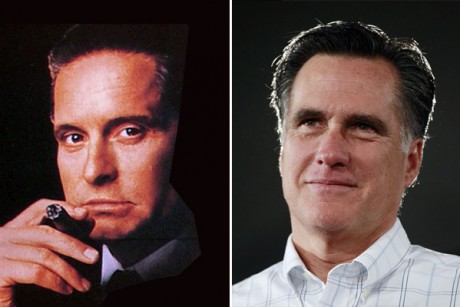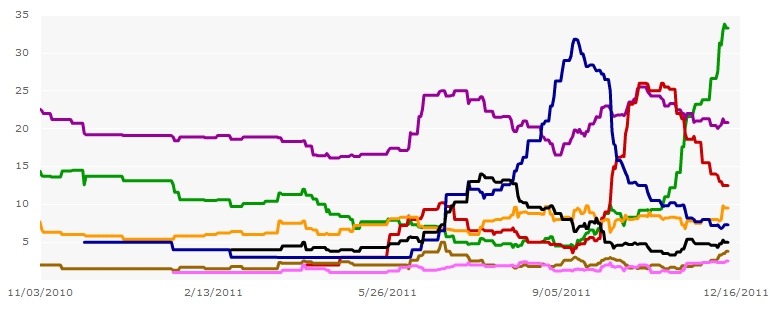It is probably no coincidence that CNN, which is hosting tomorrow’s South Carolina debate, hyped the results of its latest poll from that state as evidence “that [Romney’s] advantage over Newt Gingrich is rapidly shrinking.” In fact, the poll taken Jan. 13-17 – a survey period almost entirely before Monday’s debate – has Romney up by 10% over Gingrich, 33% to 23%, with Santorum a distant third with 16%. Yes, that does represent a 9% swing in Newt’s favor since the previous CNN poll two weeks before. However, as Mark Halperin notes, that previous poll was something of an outlier because it showed Romney with a bigger lead than most other polls. In the intervening two weeks, most other polls have shown Romney’s lead increasing – not diminishing.
Despite that caveat, I think that the tail end of the CNN survey may have caught a mini-Gingrich polling boomlet triggered not just by his strong debate performance, but also the impact of the raft of negative advertising that collectively has hit Mitt where it hurts the most: his ample wallet.
It really began, of course, with Romney’s rather indelicate remarks during the New Hampshire campaign regarding his love of pink slips and his own brushes with poverty, both of which became fodder for Newt’s campaign commercials. Then there was the 30-minute docu-ad, funded by a pro-Newt SuperPac, chronicling Romney’s role at Bain Capital. On Monday, in a rather stunning debate gaffe, Mitt equivocated on whether he would release his tax returns, finally saying he might do it sometime in April – when, presumably, he will have the nomination clinched. In the aftermath of that stumble, he acknowledged that most of his income was now taxed at the 15% capital gains rate – all perfectly legit, but less than the rate many Americans pay. He also acknowledged earning additional money through speaking fees, but said it wasn’t very much – if you consider over $300,000 from last year alone not much! Finally, two hours ago ABC released this story with the headline “Romney Parks Millions In Offshore Tax Haven.”
Again, if you read the story, it is quite clear that Romney has done nothing wrong, and that the Cayman Islands are a tax haven for foreign investors – not for Romney. Nonetheless, the cumulative impact of these stories has been to paint Romney as a latter day Gordon Gekko, the Michael Douglas character in the film Wall St. who famously expounded on the virtues of greed.

All this in a state where unemployment is pushing 10%. Needless to say, the beneficiary of the Mitt-as-Gekko storyline has been Newt Gingrich. When John King announced the CNN poll tonight, he hinted that the results of that part of the survey done after Monday’s debate showed much greater gains for Gingrich. Of course, given the limited sample size, we need to be cautious about interpreting the results. We will know more tomorrow, when NBC is supposed to reveal the results of their first post-debate poll. Gingrich – never one to take good news quietly – has now gone on record as saying he will win on Saturday. The only question is by how much. I’m guessing he has additional internal polling results that show him gaining ground.
Meanwhile, as expected, Mitt is not taking this sitting down. He’s rallied the Republican establishment against Newt, with an effort to brand the former Speaker as unreliable, as the following ad shows. .
All this sets up a delicious rematch in tomorrow’s debate, and I haven’t even begun to mention Santorum, whose polls numbers are slipping, or Paul, who certainly is looking to rebound. One area that has gotten a bit of media play again is Newt’s relatively moderate stance on immigration, which may serve him well looking ahead to Florida and Nevada, but which will not play well in South Carolina. I expect Romney to counterpunch on both these themes in tomorrow’s debate.
South Carolina: It’s Gekko vs. the Newt in the Battle To be Lizard King*
*Ok, a newt is technically an amphibian. Still….


